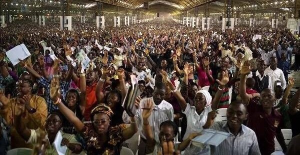
The Church remains one of the most influential and enduring institutions in Ghana. It does not rely on taxes, state funding, or government subventions. It depends entirely on the voluntary contributions of its members. Yet, its footprint in national development is undeniable.
When Dr. Kwame Nkrumah took the reins of leadership, Ghana had 136 secondary schools—133 of them were mission-founded. This statistic is not just historical trivia; it is a testament to how deeply the Church shaped the intellectual and moral foundation of this nation. Without mission schools, many of us would never have seen the classroom.
In the health sector, the Church provides over 40% of the nation’s healthcare services—saving lives, nurturing the weak, and reaching communities where government presence is thin. These are tangible contributions, not mere words.
However, the time has come for the Church to broaden its focus. Beyond education and health, we must actively promote economic empowerment and business development among members. True transformation will not be achieved through sermons alone but through equipping believers to create jobs, drive innovation, and model integrity in enterprise. The early missionaries built schools and hospitals; today’s Church must build industries and institutions of excellence.
Yet, it would be dishonest to ignore the growing shadow within our own walls. Charlatans and self-styled prophets have infiltrated the pulpit, exploiting the faith of sincere believers for personal gain. They have tarnished the image of the Church, making some perceive Christianity as a trade rather than a calling. But let us be clear: these opportunists do not define the Church. They are parasites feeding off its credibility.
Ironically, while false ministers exploit the Church, politicians—many of whom preside over corruption and mismanagement—are quick to blame the Church for the moral decay of society. They forget that it is politics, not the pulpit, that has become the quickest path to wealth and influence.
The Church, however, cannot afford to respond with bitterness or retreat into silence. It must reclaim its prophetic voice. It must remain the moral conscience of the nation—bold enough to confront corruption, compassionate enough to serve the poor, and visionary enough to inspire development.
Our light must shine not only in the sanctuary but in the public square, in the marketplace, in technology, and in governance. Every Christian must ask: What am I doing to make my light shine where God has placed me?
If the Church loses its light, the nation will stumble in darkness. But if the Church rises again—united, accountable, and focused on service—then Ghana’s future will yet be bright.
Rev Derek Amoo-Sakyi
 clcgh.org Building The Capacity Of Christian Leaders, Equipping The Saints For The Work Of Ministry, Redirecting Straying Christians To The Sound Knowledge Of Christ
clcgh.org Building The Capacity Of Christian Leaders, Equipping The Saints For The Work Of Ministry, Redirecting Straying Christians To The Sound Knowledge Of Christ



